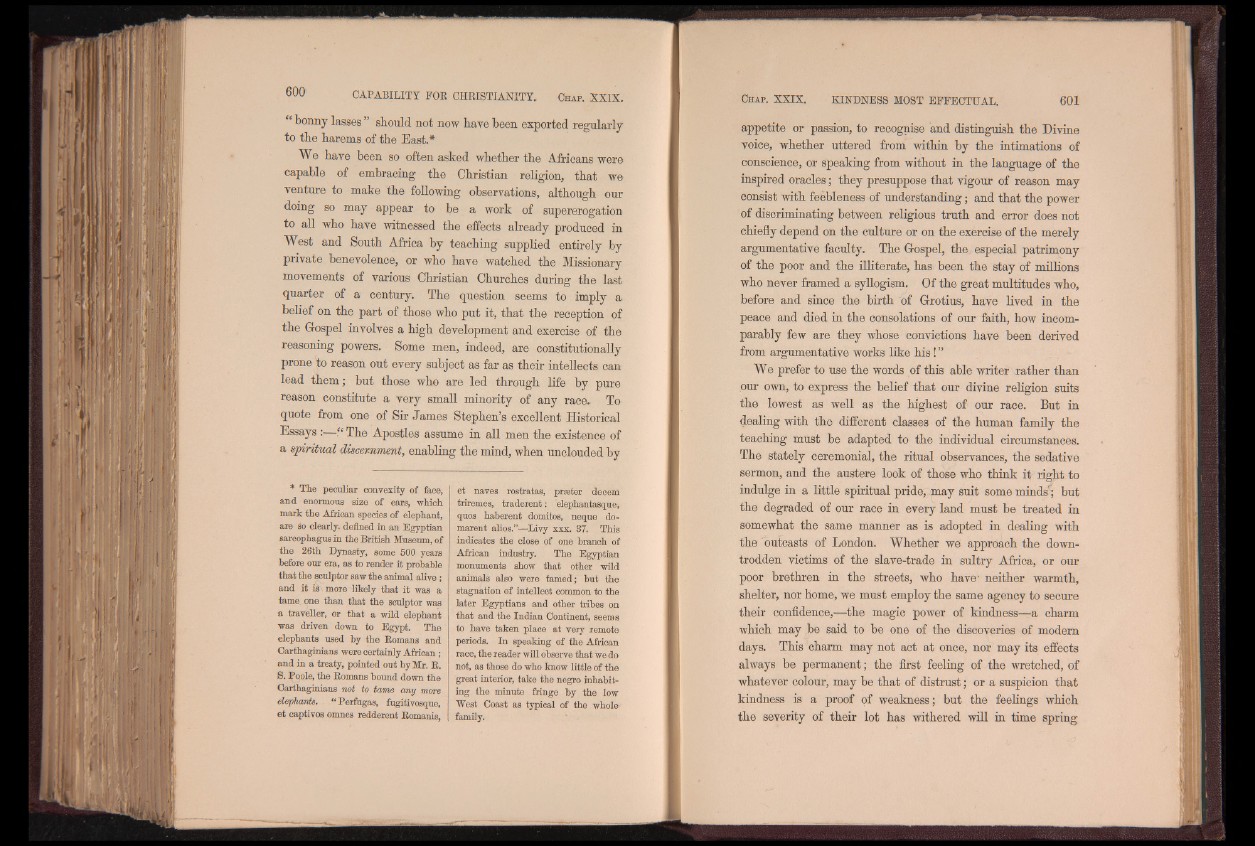
“ bonny lasses ” should not now have been exported regularly
to the harems of the East.*
We have been so often asked whether the Africans were
capable of embracing the Christian religion, that we
venture to make the following observations, although our
doing so may appear to be a work of supererogation
to all who have witnessed the effects already produced in
West and South Africa by teaching supplied entirely by
private benevolence, or who have watched the Missionary
movements of various Christian Churches during the last
quarter of a century. The question seems to imply a
belief on the part of those who put it, that the reception of
the Gospel involves a high development and exercise of the
reasoning powers. Some men, indeed, are constitutionally
prone to reason out every subject as far as their intellects can
lead them; but those who are led through life by pure
reason constitute a very small minority of any race. To
quote from one of Sir James Stephen’s excellent Historical
Essays :—“ The Apostles assume in all men the existence of
a spiritual discernment, enabling the mind, when unclouded by
* The peculiar convexity of face,
and enormous size of ears, which
mark the African species of elephant,
are so clearly, defined in an Egyptian
sarcophagus in the British Museum, of
the 26th Dynasty, some 500 years
before our era, as to render it probable
that the sculptor saw the animal alive ;
and it is more likely that it was a
tame, one than that the sculptor was
a traveller, or that a wild elephant
was driven down to Egypt. The
elephants used by the Romans and
Carthaginians were certainly African ;
and in a treaty, pointed out by Mr. R.
S. Boole, the Romans bound down the
Carthaginians not to tome any more
elephants. “ Perfugas, fugitivosque,
et captivos omnes redderent Romanis,
et naves rostratas, præter decem
triremes, traderent : elephantasque,
quos haberent domitos, neque do-
marent alios.”—Livy xxx. 37. This
indicates the close of one branch of
African industry. The Egyptian
monuments show that other wild
animals also were tamed; but the
stagnation of intellect common to the
later Egyptians and other tribes on
that and the Indian Continent, seems
to have taken place at very remote
periods. In speaking of the African
race, the reader will observe that we do
not, as those do who know little of the
great interior, take the negro inhabiting
the minute fringe by the low
West Coast as typical of the whole
family.
appetite or passion, to recognise and distinguish the Divine
voice, whether uttered from within by the intimations of
conscience, or speaking from without in the language of the
inspired oracles; they presuppose that vigour of reason may
consist with feebleness of understanding; and that the power
of discriminating between religious truth and error does not
chiefly depend on the culture or on the exercise of the merely
argumentative faculty. The Gospel, the especial patrimony
of the poor and the illiterate, has been the stay of millions
who never framed a syllogism. Of the great multitudes who,
before and since the birth of Grotius, have lived in the
peace and died in the consolations of our faith, how incomparably
few are they whose convictions have been derived
from argumentative works like h is! ”
We prefer to use the words of this able writer rather than
our own, to express the belief that our divine religion suits
the lowest as well as the highest of our race. But in
dealing with the different classes of the human family the
teaching must be adapted to the individual circumstances.
The stately ceremonial, the ritual observances, the sedative
sermon, and the austere look of those who think it right to
indulge in a little spiritual pride, may suit some minds'-; but
the degraded of our race in every land must be treated in
somewhat the same manner as is adopted in dealing with
the outcasts of London. Whether we approach the downtrodden
victims of the slave-trade in sultry Africa, or our
poor brethren in the streets, who have- neither warmth,
shelter, nor home, we must employ the same agency to secure
their confidence,—the magic power of kindness—a charm
which may be said to be one of the discoveries of modem
days. This charm may not act at once, nor may its effects
always be permanent; the first feeling of the wretched, of
whatever colour, may be that of distrust; or a suspicion that
kindness is a proof of weakness; but the feelings which
the severity of their lot has withered will in time spring